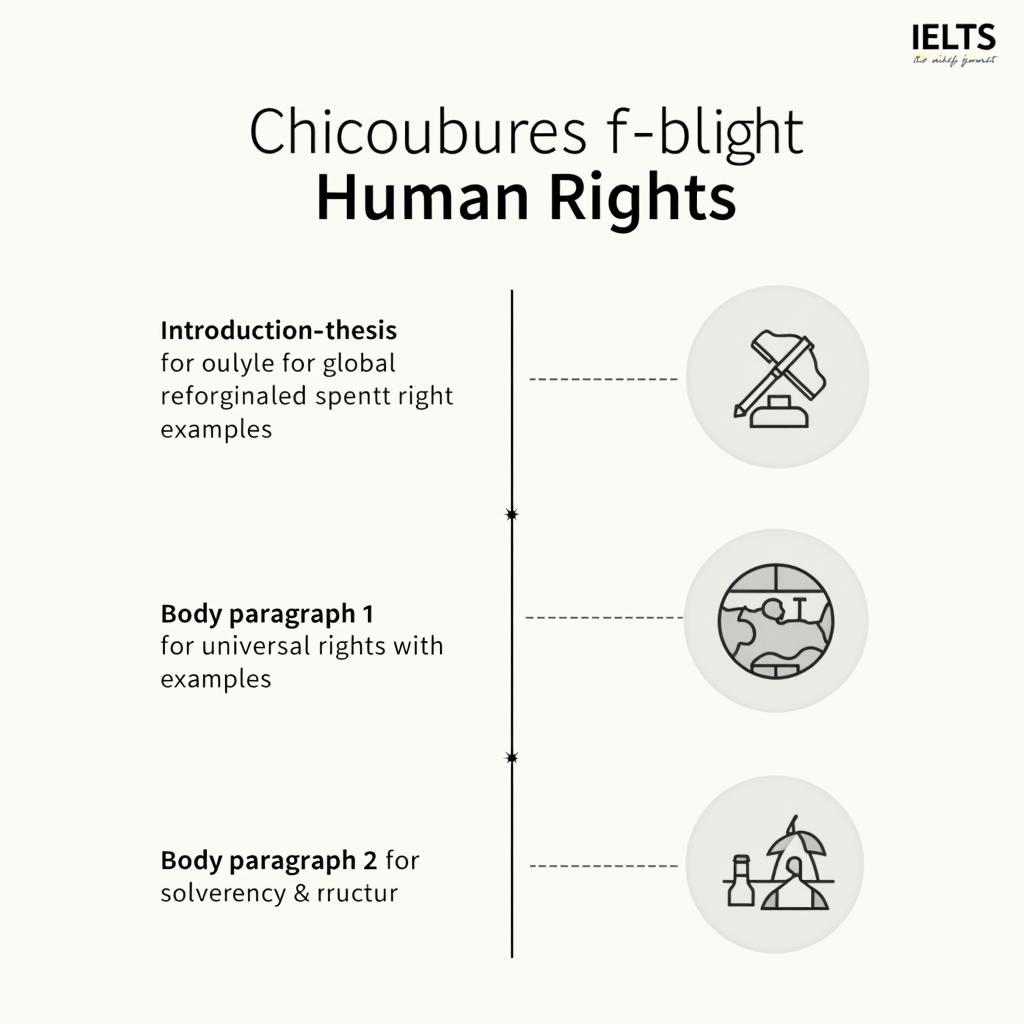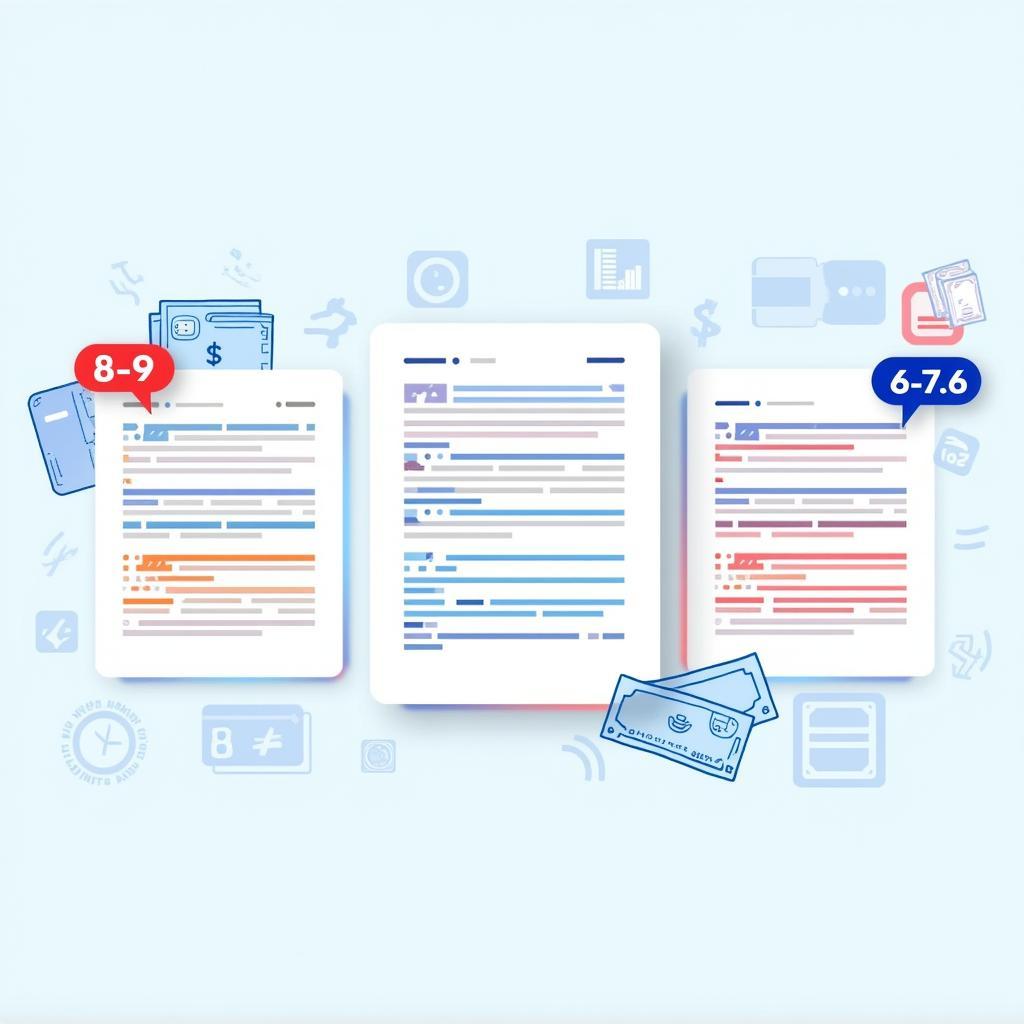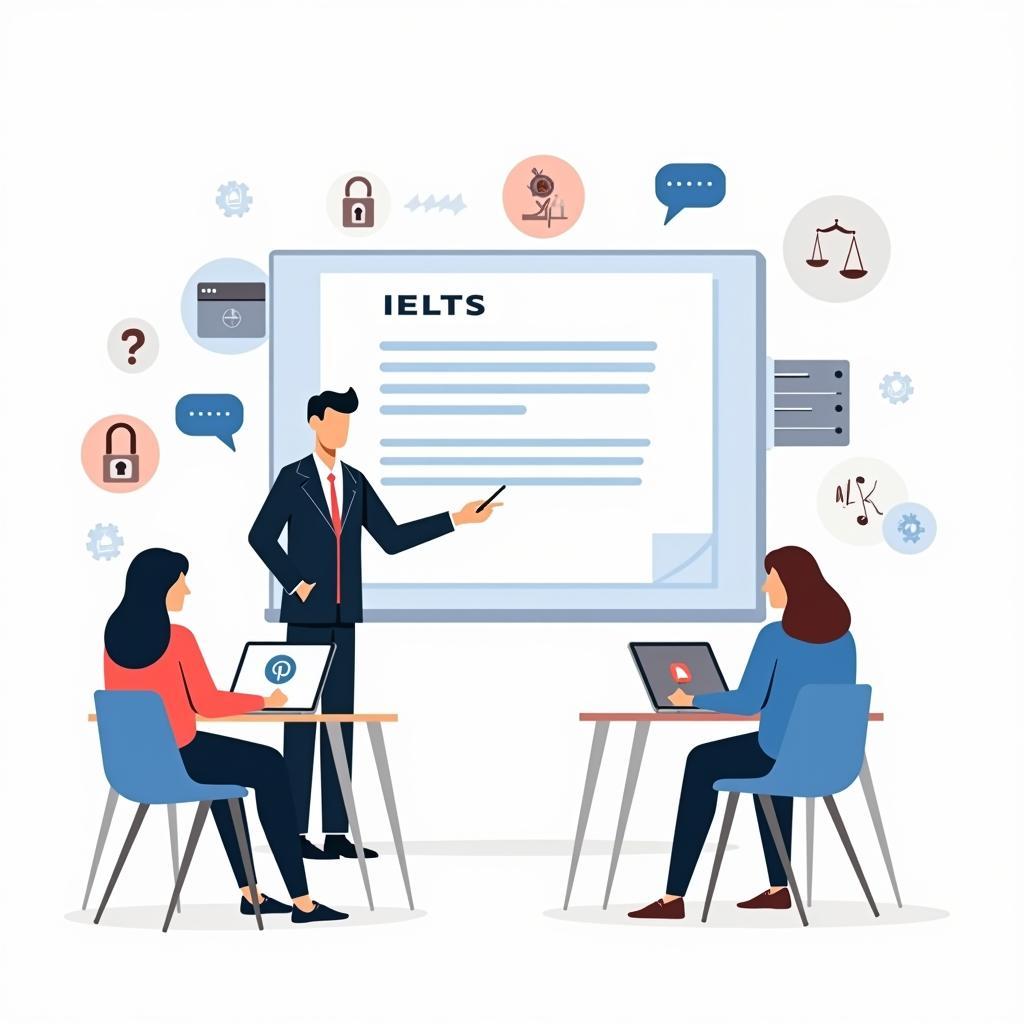Trong IELTS Writing Task 2, The Need For Global Human Rights xuất hiện với nhiều biến thể: tự do ngôn luận, bảo vệ quyền con người qua biên giới, cân bằng giữa chủ quyền quốc gia và chuẩn mực phổ quát… Chủ đề này không chỉ giàu chiều sâu học thuật mà còn tạo “đất diễn” để bạn thể hiện tư duy phản biện, khái niệm học thuật và cấu trúc câu nâng cao. Trong bài viết này, bạn sẽ có:
- 3 bài mẫu (Band 8-9, 6.5-7, 5-6) với highlight điểm ăn điểm
- Phân tích chấm điểm theo 4 tiêu chí chính thức của IELTS
- Từ vựng học thuật, cấu trúc câu “ăn điểm”, checklist tự đánh giá và chiến lược triển khai
- 2-3 đề thi/đề luyện tương tự đã lưu hành rộng rãi trên các nguồn uy tín như IELTS Liz, IELTS-Blog, British Council
Các đề tham khảo tiêu biểu:
- Some people argue that human rights are universal and should be upheld everywhere, even if this involves intervening in a country’s internal affairs. Others believe that cultural values and national sovereignty must take precedence. Discuss both views and give your own opinion.
- Freedom of expression should be limited on social media to prevent harm. Do the advantages of this outweigh the disadvantages?
- Wealthy nations should do more to protect human rights in poorer countries. To what extent do you agree or disagree?
Để mở rộng góc nhìn về quyền số trong thời đại công nghệ, bạn có thể tham khảo phân tích liên quan tại The impact of AI on privacy laws: https://vn.ielts.net/the-impact-of-ai-on-privacy-laws/
1. Đề Writing Part 2
Some people argue that human rights are universal and should be upheld by the international community everywhere, even if this involves intervening in a country’s internal affairs. Others believe that cultural values and national sovereignty must take precedence. Discuss both views and give your own opinion.
Dịch đề: [Một số người cho rằng quyền con người là phổ quát và cần được cộng đồng quốc tế bảo vệ ở mọi nơi, ngay cả khi phải can thiệp vào công việc nội bộ của một quốc gia. Những người khác tin rằng giá trị văn hóa và chủ quyền quốc gia phải được đặt lên hàng đầu. Hãy thảo luận cả hai quan điểm và đưa ra ý kiến của bạn.]
Phân tích đề bài:
- Dạng câu hỏi: Discuss both views + Give your opinion (thảo luận 2 quan điểm và nêu ý kiến cá nhân).
- Thuật ngữ quan trọng:
- Universal human rights: quyền con người mang tính phổ quát, không thể tước đoạt.
- International intervention: can thiệp quốc tế (có thể ngoại giao, pháp lý, nhân đạo).
- National sovereignty: chủ quyền quốc gia.
- Take precedence: được ưu tiên hơn.
- Lỗi thường gặp của học viên Việt Nam:
- Đi chệch đề sang chính trị cụ thể của từng quốc gia.
- Chỉ liệt kê các quyền mà không phát triển lập luận.
- Thiếu quan điểm rõ ràng hoặc “để mở” không kết luận.
- Lạm dụng từ vựng “big words” nhưng dùng sai collocations (ví dụ “protecting sovereignty rights universally”).
- Chiến lược:
- Mở bài: paraphrase + thesis nêu rõ sẽ cân nhắc cả hai phía và nghiêng về quan điểm nào.
- Thân bài 1: Lập luận ủng hộ tính phổ quát (ví dụ UDHR 1948, cơ chế quốc tế, can thiệp nhân đạo có điều kiện).
- Thân bài 2: Lập luận ủng hộ chủ quyền & đa dạng văn hóa (cảnh báo “cultural imperialism”, tiêu chuẩn kép).
- Kết luận: Tái khẳng định quan điểm, nêu tiêu chí cân bằng (case-by-case, proportionality, international law).
 Minh họa chiến lược viết IELTS Task 2 về The need for global human rights và phân tích cấu trúc
Minh họa chiến lược viết IELTS Task 2 về The need for global human rights và phân tích cấu trúc
2. Bài mẫu Band 8-9
Đặc điểm: Lập luận sâu, cân bằng, ví dụ toàn cầu, cấu trúc câu đa dạng, collocations chính xác, kiểm soát giọng văn học thuật.
Bài luận (khoảng 300 từ):
In debates about human rights, two powerful principles often collide: the universality of fundamental rights and the primacy of national sovereignty. While international action can be warranted when grave abuses occur, I contend that intervention must be lawful, proportionate, and a last resort in order to avoid unintended harms.
Those who support universal enforcement argue that rights such as life, liberty, and freedom from torture are inalienable and should not be compromised by culture or politics. From this perspective, global mechanisms—ranging from sanctions to carefully targeted humanitarian measures—are sometimes the only safeguards when domestic institutions are complicit or powerless. Without credible international pressure, impunity can become entrenched, and victims may have no pathway to redress. Moreover, international law, including the Universal Declaration of Human Rights, provides a shared benchmark that helps distinguish cultural practices from clear violations.
However, critics warn that robust intervention can backfire. External pressure may fuel nationalist backlash, undermine fragile reforms, or be perceived as moral paternalism. Cultures evolve through dialogue, not coercion, and legitimate differences—such as approaches to restorative justice or community obligations—should not be caricatured as abuses. There is also the risk of double standards, where powerful states enforce norms selectively.
On balance, human rights are universal, but enforcement should be context-sensitive. The international community ought to prioritize prevention—supporting civil society, independent courts, and free media—while reserving coercive measures for well-documented, large-scale violations and only with multilateral legitimacy. By striking a careful balance between universality and sovereignty, we can protect individuals without eroding the foundations of international order that, paradoxically, make rights protection possible.
Phân tích Band điểm
| Tiêu chí | Band | Nhận xét |
|---|---|---|
| Task Response (Hoàn thành yêu cầu) | 8 | Trả lời đúng dạng Discuss both views + opinion, có lập trường rõ, phát triển ý bằng lập luận và ví dụ khái quát đáng tin cậy. Thiếu ví dụ cụ thể tên quốc gia để tránh nhạy cảm, nhưng vẫn đủ thuyết phục. |
| Coherence & Cohesion (Mạch lạc & Liên kết) | 8 | Bố cục 4 đoạn chuẩn, luận điểm tiến triển logic, sử dụng chuyển đoạn hài hòa. Liên kết ý tự nhiên, không lạm dụng từ nối. |
| Lexical Resource (Từ vựng) | 8 | Từ vựng chủ đề phong phú: inalienable, impunity, redress, paternalism, double standards. Collocations chính xác, diễn đạt chuẩn học thuật. |
| Grammatical Range & Accuracy (Ngữ pháp) | 8 | Câu phức, mệnh đề quan hệ, cụm phân từ, cấu trúc điều kiện và nhấn mạnh được dùng linh hoạt; hầu như không có lỗi ngữ pháp. |
Các yếu tố giúp bài này được chấm điểm cao
- Luận đề rõ ràng: “lawful, proportionate, last resort” tạo khung đánh giá nhất quán.
- Cân bằng “universality vs sovereignty” thay vì cực đoan một phía.
- Từ vựng học thuật sát chủ đề và dùng đúng ngữ cảnh.
- Cấu trúc câu đa dạng: mệnh đề phụ, cụm phân từ, cụm danh từ mở rộng.
- Liên kết logic mượt mà giữa ý và đoạn, tránh liệt kê.
- Tránh ví dụ nhạy cảm, giữ giọng văn khách quan, học thuật.
- Kết luận không lặp lại máy móc mà tổng hợp nguyên tắc hành động.
3. Bài mẫu Band 6.5-7
Đặc điểm: Lập luận đúng trọng tâm, có ví dụ, vốn từ khá, vẫn còn một vài chỗ lặp từ hoặc cấu trúc chưa tinh tế.
Bài luận (khoảng 260-275 từ):
People often disagree about whether international organisations should enforce human rights everywhere or whether each country should decide for itself. On the one hand, universal standards protect individuals when domestic systems fail. If courts are weak and the media is censored, abuses can be hidden, so international reporting, sanctions, or even humanitarian assistance may become necessary. This global oversight also discourages impunity and signals that torture or discrimination are unacceptable regardless of culture.
On the other hand, sovereignty matters. External pressure can provoke resistance and make governments less cooperative, especially if they think outsiders do not understand local history. Some practices reflect social values, and even if they seem unusual, they are not always violations. There is also a risk of selective enforcement, where powerful countries push their agenda, which undermines trust in the whole system.
In my view, human rights should be universal, but actions must be careful and multilateral. International actors should support prevention by funding legal aid, education, and independent journalism, and only apply stronger measures when there is clear evidence of serious, systemic harm. This approach balances protection with respect, and it is more sustainable because it builds local capacity instead of imposing quick fixes from outside.
Phân tích Band điểm
| Tiêu chí | Band | Nhận xét |
|---|---|---|
| Task Response (Hoàn thành yêu cầu) | 7 | Trả lời đủ 2 quan điểm và có ý kiến. Lập luận hợp lý nhưng ví dụ còn khái quát, thiếu tính cụ thể sâu. |
| Coherence & Cohesion (Mạch lạc & Liên kết) | 7 | Bố cục rõ ràng, chuyển ý mượt. Vẫn có vài chỗ lặp ý nhẹ và dùng từ nối quen thuộc. |
| Lexical Resource (Từ vựng) | 7 | Vốn từ phù hợp chủ đề (impunity, selective enforcement) nhưng phạm vi chưa thật đa dạng; một số cụm còn trung tính. |
| Grammatical Range & Accuracy (Ngữ pháp) | 7 | Câu phức dùng ổn định, ít lỗi. Chưa có nhiều cấu trúc nâng cao như đảo ngữ hoặc câu chẻ. |
So sánh với bài Band 8-9
- Từ vựng ít tính phân biệt khái niệm (thiếu “proportionate”, “paternalism”, “multilateral legitimacy”).
- Thiếu các tiêu chí đánh giá can thiệp rõ (lawful, proportionate, last resort).
- Cấu trúc câu chưa có điểm nhấn hình thức (đảo ngữ, cleft) nên sắc thái học thuật thấp hơn.
- Phạm vi ví dụ vẫn tổng quát, chưa thuyết phục bằng nguyên tắc chính sách cụ thể.
Đối với quyền được sống trong môi trường an toàn và thông tin minh bạch, nội dung này có điểm tương đồng với how to address the challenges of food insecurity khi bàn về quyền tiếp cận lương thực và an ninh dinh dưỡng: https://vn.ielts.net/how-to-address-the-challenges-of-food-insecurity/
4. Bài mẫu Band 5-6
Đặc điểm: Bám đề cơ bản nhưng còn lan man, từ vựng lặp, ngữ pháp lỗi rải rác, ví dụ mơ hồ.
Bài luận (khoảng 255-265 từ):
Some people say human rights are the same everywhere, but others say culture and sovereignty are more important. I think both sides have reasons, but people rights must be keep by world. When a country has bad government who do not care, then international groups should go and fix it. Without interfere, the situation can be worse and people suffer more. Also, rights like freedom, speak and safety are basic and cannot be sacrifice for some traditions.
However, some interventions make angry reaction and create more problems. Countries may feel lose their face and do the opposite. Culture is complex and have many special meanings. If foreigners judge too fast, they can be wrong. In the other hand, sometimes different culture is not violation, just different.
In conclusion, global human rights are need, but we also should respect local contexts. The best way is to discuss first and only use strong actions when the evidences is clear. This will reducing conflicts and help people life better in long term.
Phân tích Band điểm
| Tiêu chí | Band | Nhận xét |
|---|---|---|
| Task Response (Hoàn thành yêu cầu) | 6 | Có trả lời cả hai phía và nêu ý kiến, nhưng lập luận còn chung chung, thiếu phát triển và dẫn chứng xác đáng. |
| Coherence & Cohesion (Mạch lạc & Liên kết) | 5 | Liên kết rời rạc, từ nối sai (“In the other hand”), lặp ý. Câu chủ đề chưa rõ. |
| Lexical Resource (Từ vựng) | 5 | Lặp từ (rights, culture), collocation sai (“cannot be sacrifice”), dùng từ không tự nhiên (“lose their face”). |
| Grammatical Range & Accuracy (Ngữ pháp) | 5 | Nhiều lỗi chia động từ, mạo từ, số nhiều, giới từ (“people rights”, “without interfere”, “evidences”). Cấu trúc câu đơn giản. |
Những lỗi sai của bài – phân tích & giải thích
| Lỗi sai | Loại lỗi | Sửa lại | Giải thích |
|---|---|---|---|
| people rights | Mạo từ & sở hữu | people’s rights | Cần dùng sở hữu cách với danh từ số nhiều: people’s. |
| must be keep | Động từ bị động | must be kept | Dạng bị động: be + V3. |
| bad government who | Đại từ quan hệ | a bad government that/which | Government là vật/thể chế: that/which. |
| Without interfere | Danh động từ | Without interfering | Sau giới từ dùng V-ing. |
| freedom, speak and safety | Danh từ | freedom of speech and safety | Cụm cố định: freedom of speech. |
| cannot be sacrifice | Danh/động từ | cannot be sacrificed | V3 bị động: sacrificed. |
| make angry reaction | Collocation | provoke an angry reaction | Collocation tự nhiên. |
| lose their face | Collocation | lose face | Thành ngữ đúng là “lose face”. |
| have many special meanings | Thì/số | has many special meanings | Culture (khái niệm số ít): has. |
| In the other hand | Từ nối | On the other hand | Cụm nối chính xác. |
| evidences is | Số & hòa hợp | evidence is / the evidence is | Evidence không đếm được. |
| will reducing | Thì/khung | will reduce | Will + V nguyên mẫu. |
| people life | Sở hữu | people’s lives | Cần sở hữu & số nhiều chính xác. |
Cách Cải Thiện Từ Band 6 Lên Band 7
- Sửa lỗi cơ bản: mạo từ (a/an/the), hòa hợp chủ-vị, số ít/số nhiều, giới từ.
- Tăng collocations đúng chủ đề: uphold rights, proportional response, selective enforcement.
- Nâng cấp cấu trúc câu: mệnh đề quan hệ, câu điều kiện, cụm phân từ; tránh chỉ dùng câu đơn.
- Phát triển ví dụ theo nguyên tắc: nêu vấn đề → hậu quả → giải pháp/tiêu chí can thiệp.
- Mở và kết đoạn bằng câu chủ đề rõ ràng; tránh lặp lại ý chung chung.
Liên quan tới quyền của người lao động trong kỷ nguyên sản xuất thông minh, điều này có điểm tương đồng với why automation is the future of manufacturing khi bàn về tác động đến việc làm và tiêu chuẩn lao động: https://vn.ielts.net/why-automation-is-the-future-of-manufacturing/
5. Từ vựng quan trọng cần nhớ
| Từ/Cụm từ | Loại từ | Phiên âm | Nghĩa tiếng Việt | Ví dụ (English) | Collocations |
|---|---|---|---|---|---|
| inalienable rights | adj + n | /ɪnˈeɪliəˌnəbl/ | quyền không thể tước đoạt | Inalienable rights must not depend on politics. | inalienable dignity/rights |
| universality | n | /ˌjuːnɪˌvɜːsɪˈæləti/ | tính phổ quát | The universality of rights is contested. | universality claim/principle |
| sovereignty | n | /ˈsɒvrɪnti/ | chủ quyền | Sovereignty can constrain intervention. | national/state sovereignty |
| humanitarian intervention | n | /hjuːˌmænɪˈteəriən/ | can thiệp nhân đạo | Humanitarian intervention remains controversial. | justify/oppose intervention |
| proportionality | n | /prəˌpɔːʃəˈnæləti/ | tính tương xứng | Sanctions should meet proportionality tests. | proportionality principle/test |
| impunity | n | /ɪmˈpjuːnɪti/ | miễn trừ trừng phạt | Impunity encourages repeated abuses. | culture of impunity |
| redress | n/v | /rɪˈdrɛs/ | (sự) đền bù, sửa sai | Victims need access to redress. | seek/offer redress |
| non-discrimination | n | /ˌnɒn dɪˌskrɪmɪˈneɪʃn/ | không phân biệt đối xử | Non-discrimination is a core norm. | principle of non-discrimination |
| accountability | n | /əˌkaʊntəˈbɪləti/ | trách nhiệm giải trình | International accountability mechanisms matter. | ensure/enhance accountability |
| to uphold (rights) | v | /ʌpˈhəʊld/ | duy trì, bảo vệ | Courts must uphold constitutional rights. | uphold standards/rights |
| to infringe (rights) | v | /ɪnˈfrɪndʒ/ | xâm phạm | Policies must not infringe basic rights. | infringe on/upon rights |
| to safeguard | v | /ˈseɪfɡɑːd/ | bảo vệ | Laws should safeguard minorities. | safeguard interests/rights |
| strike a balance | v phr | /straɪk ə ˈbæləns/ | tìm điểm cân bằng | We must strike a balance between values. | strike a balance between A and B |
| at the expense of | prep phr | /ˌɛkˈspɛns/ | đánh đổi, gây hại cho | Do not act at the expense of justice. | at the expense of freedom |
| by the same token | linker | /ˈtəʊkən/ | tương tự, cùng lý lẽ | By the same token, culture matters. | by the same token, … |
6. Cấu trúc câu dễ ăn điểm cao
- Câu phức với mệnh đề phụ thuộc
- Công thức: Mệnh đề chính + when/if/because/although + mệnh đề phụ.
- Ví dụ (từ bài Band 8-9): “While international action can be warranted when grave abuses occur, I contend that …”
- Vì sao ghi điểm: Tạo quan hệ nhân-quả, nhượng bộ rõ ràng, tăng tính logic.
- Ví dụ bổ sung:
- Although enforcement is necessary, it must be proportionate.
- Because institutions are weak, external scrutiny becomes vital.
- Lỗi thường gặp: Dùng “Although but”; thiếu dấu phẩy đúng chỗ.
- Mệnh đề quan hệ không xác định (non-defining)
- Công thức: Danh từ, which/who + mệnh đề phụ, …
- Ví dụ: “There is also the risk of double standards, which powerful states may exploit.”
- Điểm mạnh: Bổ sung thông tin, tăng tính tinh tế.
- Ví dụ bổ sung:
- “International norms, which evolved after 1948, guide today’s debates.”
- “Such measures, which are controversial, must be justified.”
- Lỗi thường gặp: Quên dấu phẩy; dùng “that” thay “which”.
- Cụm phân từ
- Công thức: V-ing/V-ed + cụm bổ nghĩa, …
- Ví dụ: “Ranging from sanctions to carefully targeted humanitarian measures, global mechanisms…”
- Điểm mạnh: Cô đọng, nhịp văn tự nhiên.
- Ví dụ bổ sung:
- “Acting without clear evidence, states risk escalation.”
- “Designed to deter abuses, these policies require oversight.”
- Lỗi thường gặp: Gắn sai chủ ngữ gây “dangling modifier”.
- Câu chẻ (Cleft sentences)
- Công thức: It is/was + thành phần nhấn mạnh + that/who + mệnh đề.
- Ví dụ: “It is multilateral legitimacy that makes coercive measures acceptable.”
- Điểm mạnh: Nhấn mạnh thông tin then chốt.
- Ví dụ bổ sung:
- “It is prevention that delivers long-term progress.”
- “It is proportionality that differentiates pressure from coercion.”
- Lỗi thường gặp: Lạm dụng câu chẻ khiến văn gượng.
- Câu điều kiện nâng cao (mixed/third)
- Công thức: If + past perfect, would + V (hệ quả hiện tại/tương lai).
- Ví dụ: “If institutions had been stronger, international pressure would be less necessary.”
- Điểm mạnh: Diễn đạt giả định thời gian phức hợp.
- Ví dụ bổ sung:
- “If action were unilateral, it would undermine legitimacy.”
- “If evidence had been clearer, the response could have been swifter.”
- Lỗi thường gặp: Sai thì sau if; nhầm would trong mệnh đề if.
- Đảo ngữ nhấn mạnh
- Công thức: Not only + trợ động + S + V, but also…
- Ví dụ: “Not only do coercive measures risk backlash, but they can also weaken reforms.”
- Điểm mạnh: Tạo nhịp điệu, nhấn mạnh tương phản.
- Ví dụ bổ sung:
- “Only by building capacity can lasting change occur.”
- “Rarely have sanctions been perfectly targeted.”
- Lỗi thường gặp: Quên đảo trợ động; sai thì.
7. Checklist Tự Đánh Giá
-
Trước khi viết:
- Xác định dạng đề (agree/disagree, discuss both, advantages vs disadvantages).
- Gạch tiêu chí lập luận: tiêu chuẩn can thiệp, tính phổ quát, chủ quyền.
- Lên dàn ý 3-4 đoạn, mỗi đoạn 2-3 luận điểm nhỏ.
-
Trong khi viết:
- Câu chủ đề rõ ở mỗi đoạn.
- Dùng collocations chuẩn: uphold rights, selective enforcement, proportional response.
- Đa dạng cấu trúc câu; tránh lặp từ khóa bằng từ đồng nghĩa.
-
Sau khi viết:
- Soát mạo từ, số ít/số nhiều, thì đồng nhất.
- Kiểm tra từ nối và liên kết tham chiếu (this approach, such measures).
- Cắt câu thừa, thay “big words” mơ hồ bằng collocation chính xác.
-
Mẹo quản lý thời gian:
- 5 phút lập dàn ý; 30 phút viết; 5 phút soát lỗi.
- Ưu tiên hoàn thành lập luận đủ ý trước khi “trang trí” từ vựng.
- Nếu bí ví dụ, dùng nguyên tắc/tiêu chí thay vì tên quốc gia cụ thể.
Kết bài
The need for global human rights không chỉ là chủ đề “nóng” trong IELTS Writing Task 2 mà còn là cơ hội để bạn thể hiện tư duy phân tích: cân bằng giữa tính phổ quát và chủ quyền, giữa lý tưởng và thực tiễn. Lộ trình cải thiện của bạn nên bắt đầu từ việc nắm vững dàn ý mẫu, thuần thục collocations, sau đó nâng cấp cấu trúc câu và bằng chứng lập luận. Hãy luyện viết đều đặn: 2-3 bài/tuần, mỗi bài dành 5-10 phút để phản biện và sửa lỗi, bạn sẽ thấy tiến bộ rõ rệt sau 4-6 tuần.
Đối với những ai quan tâm đến khía cạnh đạo đức và an toàn thực phẩm như một phần của quyền con người, bạn có thể tham khảo thêm Restrictions on genetically modified organisms? để mở rộng góc nhìn về quyền được tiếp cận thực phẩm an toàn: https://vn.ielts.net/restrictions-on-genetically-modified-organisms/
Nếu bạn muốn soi chiếu chủ đề quyền con người với bối cảnh công nghệ và dữ liệu, hãy xem lại phân tích về The impact of AI on privacy laws để hiểu quyền riêng tư vận hành ra sao trong kỷ nguyên số: https://vn.ielts.net/the-impact-of-ai-on-privacy-laws/
Bây giờ, hãy chọn một đề trong bài và viết ngay 250-300 từ, sau đó tự chấm theo checklist. Đừng quên chia sẻ bài viết và thắc mắc của bạn trong phần bình luận để mình và cộng đồng cùng góp ý. Việc luyện tập đều đặn, phản hồi trung thực và cập nhật từ vựng, cấu trúc là con đường ngắn nhất để chinh phục band điểm mục tiêu trong IELTS Writing Task 2.


